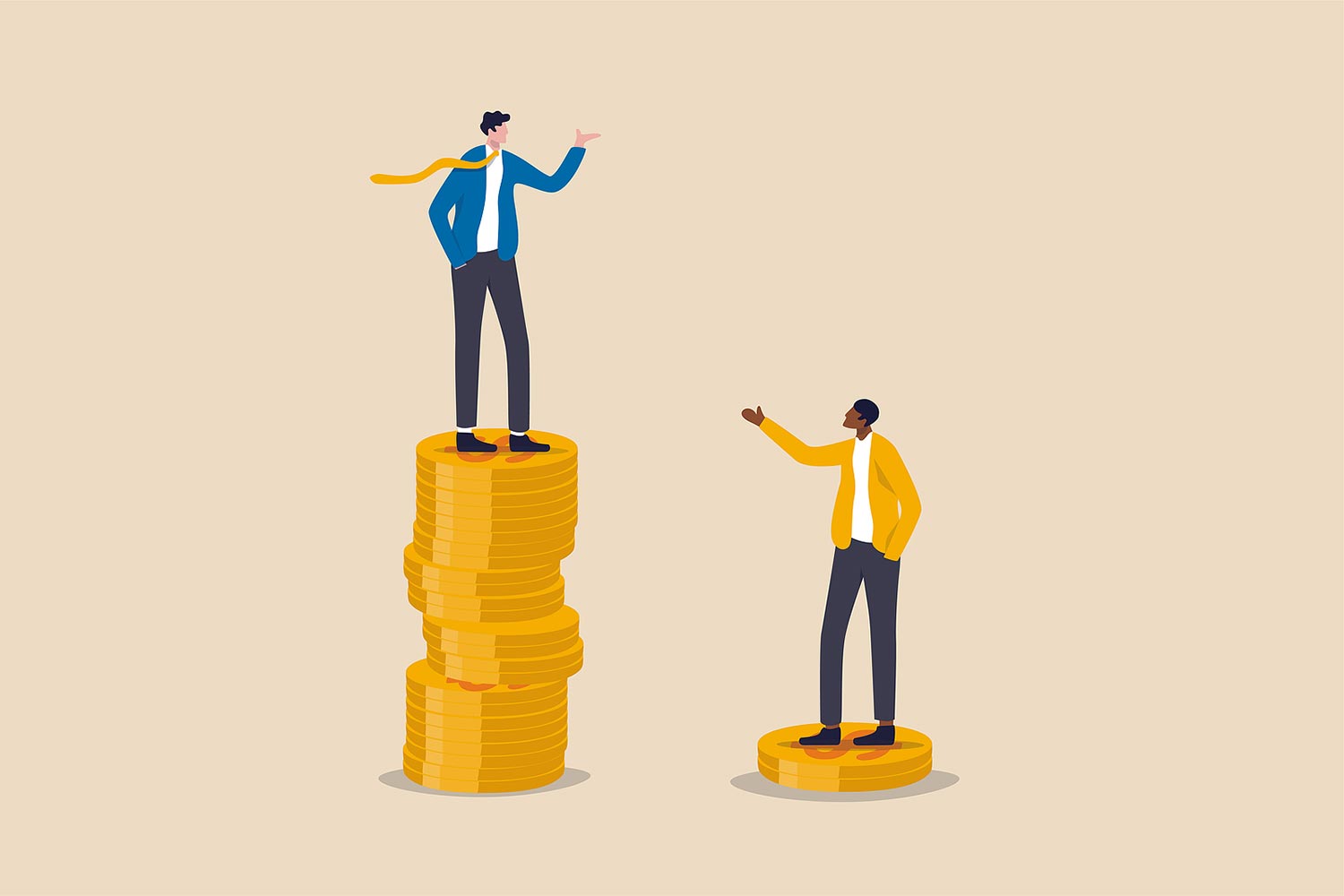Is There An Inequality Tipping Point for Nonprofits?
As the planet faces a climate crisis, inequality emerges as a new threat coming to face the nonprofit sector.

We are facing a future of growing human need. The nonprofit sector is essential to helping to mitigate the impact of climate change on communities around the world. But there are structural problems that create inequality which, in combination with climate change, pose an existential threat to the nonprofit sector itself.
Recent news reports suggest that the average global temperature may rise more than 1.5 degrees Celsius in as little as seven years. This threshold is increasingly seen by climate scientists as a probable atmospheric tipping point.
As the planet heats up, the tundra thaws and oceans warm, ice floes will melt and forests will wither — leading to even hotter temperatures and ever more dramatic weather shifts, in a vicious cycle of catastrophe.
But as climate change is manmade, it may have not just ecological but also sociological tipping points. At what point does despair become inescapable? And at what point will giving in to it fatally undermine our efforts to stop pumping carbon and methane into the air?
There is a related but distinct question that is urgent for the climate justice movement and the nonprofit sector as a whole: Is there also an inequality tipping point?
Trends in philanthropy make this a question worth asking. For many years, there has been a notable decline in the number of Americans making charitable contributions.
From 2021 to 2022, according to a Nonprofit Times article, the number of people giving to nonprofits declined by an estimated 7.1 percent.
“The largest percentage decline was the smallest donors, those who gave $100 or less,” the article notes. For these donors, the drop was a hefty 13 percent.
And yet, with occasional setbacks, the actual amount of money being given continues to rise, year after year — even as the number of people giving goes steadily down.
Some scholars are beginning to suspect that this is in part a measurement error: More gifts today are not reported in IRS data, studies are not considering other forms of giving, from GoFundMe to the dollar you might tack onto your bill at CVS.
But an obvious cause, if not the only one, is that more wealth is concentrated in fewer hands.
By and large, the wealthy give a greater proportion of their gifts from assets, while the less well-off give from income, as the Nonprofit Times article notes. As wealth has shifted upward from the middle class, it is unsurprising that the number of donors has dropped.
Less money in the pockets of ordinary Americans means less money for them to give — and it also means they have less money on hand in case of emergencies. As life feels more insecure, giving money to others is not only harder, but also riskier.
In recent decades, inequality has correlated with increased giving. The ever-expanding philanthropic pie over the past half-century, I have argued elsewhere, is inextricable from the upward shift of wealth.
So far, the wealthy have continued to shoulder the burden, giving away more each year. That comes with legitimate concerns about how the increasing importance of higher-income donors and “megagifts” may create a nonprofit sector beholden to the rich.
But an equally serious concern is this: What will happen if the rich stop giving?
No one is inherently safe from the impact of climate change. Tragically, the most severe consequences will likely be borne by the world’s poor, who did the least to cause the problem.
But we will all feel the impact and see it in the world around us. Even those who remain insulated from the harsh climatological effects will not be immune from the psychological effects of watching this catastrophe unfold.
In “Leaving the Goldilocks Zone,” I suggest that climate change may engender a sense of scarcity that undermines decades of progress on human rights.
Seventy-five years ago, when the Universal Declaration of Human Rights was adopted, we were entering a period of growing affluence, conditions favorable to a sense of generosity toward the needs and rights of others.
The challenges of a hotter world may undermine the generosity of this earlier time, fostering a kind of parochialism where threats to those close to us leave little room for concern about the threats to those far away. Justice and human rights fare best in a temperate climate.
The same point may be made about philanthropy: A warmer climate, harsher weather and unrelenting news coverage will have a psychological impact on us all. The same sense of worry, scarcity, and pessimism that threatens human rights is a worry for the philanthropic system, and the organizations that depend on it.
At the same time, worsening heat and weather will mean that the nonprofit sector is more needed than ever: The impact of climate change will cause widespread suffering that only government and nonprofit action can address.
But diminishing tax rates over the past half-century have sapped the ability of our government to address the scale of the problems that are emerging. Warren Buffett likes to say that he should not pay taxes at a lower rate than his secretary — but he does.
The wealthy have already begun their exit from supporting societal crises through funding the government. Will they also abandon the nonprofit sector as the future looks more dire?
This is the inequality tipping point that concerns me. We are already in the middle of a profound change, with giving increasingly compressed into higher wealth and income brackets.
As smaller donations continue to decline, the philanthropic system is at risk of catastrophic failure if high-net-worth individuals, driven by natural human fears, feel a need to give less and less as insurance against a dangerous future.
As we assess the distribution of wealth in our society, and what a fair system would look like, we need to consider this: A situation where the nonprofit sector in its present form cannot exist without the ultra-wealthy is one where it is in danger of collapse.
We cannot afford to maintain a system where human needs are as dependent as they are on a small philanthropic elite, because the pressures on them — and on us all — will make that dependence unsustainable.
The point where inequality tips is not yet upon us: It will come when pessimism and despair rise so high that philanthropy among the wealthy gives way to hoarding and self-protection.
But we need to prepare now. One step that we might take is to use tax policy and government investment to address inequality, and shore up insecure middle-class families whose charitable giving has declined. At the same time, philanthropy can pursue the same end.
Alongside climate change mitigation, investing in nonprofits that promote economic fairness and resilience of ordinary people will help them do their part to keep the nonprofit sector strong.
Meanwhile, messaging matters. Development professionals should take a long look at our reliance on “bad news” appeals over good news, and their potential contribution to the philanthropic despair I fear will grow in the near future.
And in any scenario, we must recognize and celebrate the power of collective action to keep us all afloat — to forestall climate change, or mitigate the harm, or failing those things, to help as many as possible to survive in a more inhospitable future.
The possibility I am describing is, underneath it all, a deep psychological trait at a crossroads: Most people have the urge to aid and care for the people around them, but when life feels precarious, the circle of caring grows tighter.
Beyond what philanthropy can do, there is the question of what any human being can do to ensure that our sense of generosity does not contract, with devastating consequences.
We must look at the possibility of a harsher future squarely, and condition ourselves to maintain our concern for the wider world, rather just than those camped at our fireside. That broad sense of generosity is essential if we are to do enough to mitigate the effects of climate change.
Human societies are made up of humans, and society will cohere only as long as we do.
You might also like:
- Using Philanthropy to Address Racial Harm and Inequity
- Beyond the Hype: Why ESG Frameworks Miss the Mark for Small Nonprofits
- How Nonprofits Can Benefit from Embracing ESG Practices
- ESG is Everywhere. Should It Matter to Nonprofits?
- Nonprofits Have Been Right All Along: Community Benefit Models Can Solve Our Toughest Environmental Challenges
You made it to the end! Please share this article!
Let’s help other nonprofit leaders succeed! Consider sharing this article with your friends and colleagues via email or social media.
About the Author
Devon Kearney is a nonprofit fundraising consultant with more than 20 years of experience working with a wide variety of nonprofit organizations in the United States and abroad, focusing on civil and human rights advocacy. In supporting the growth of more than fifty organizations as a staff member as well as a consultant, he has developed both an insiders’ and an outsiders’ perspective on the impact of fundraising practices on the fiscal health and organizational culture of nonprofits.
Articles on Blue Avocado do not provide legal representation or legal advice and should not be used as a substitute for advice or legal counsel. Blue Avocado provides space for the nonprofit sector to express new ideas. The opinions and views expressed in this article are solely those of the authors. They do not purport to reflect or imply the opinions or views of Blue Avocado, its publisher, or affiliated organizations. Blue Avocado, its publisher, and affiliated organizations are not liable for website visitors’ use of the content on Blue Avocado nor for visitors’ decisions about using the Blue Avocado website.







